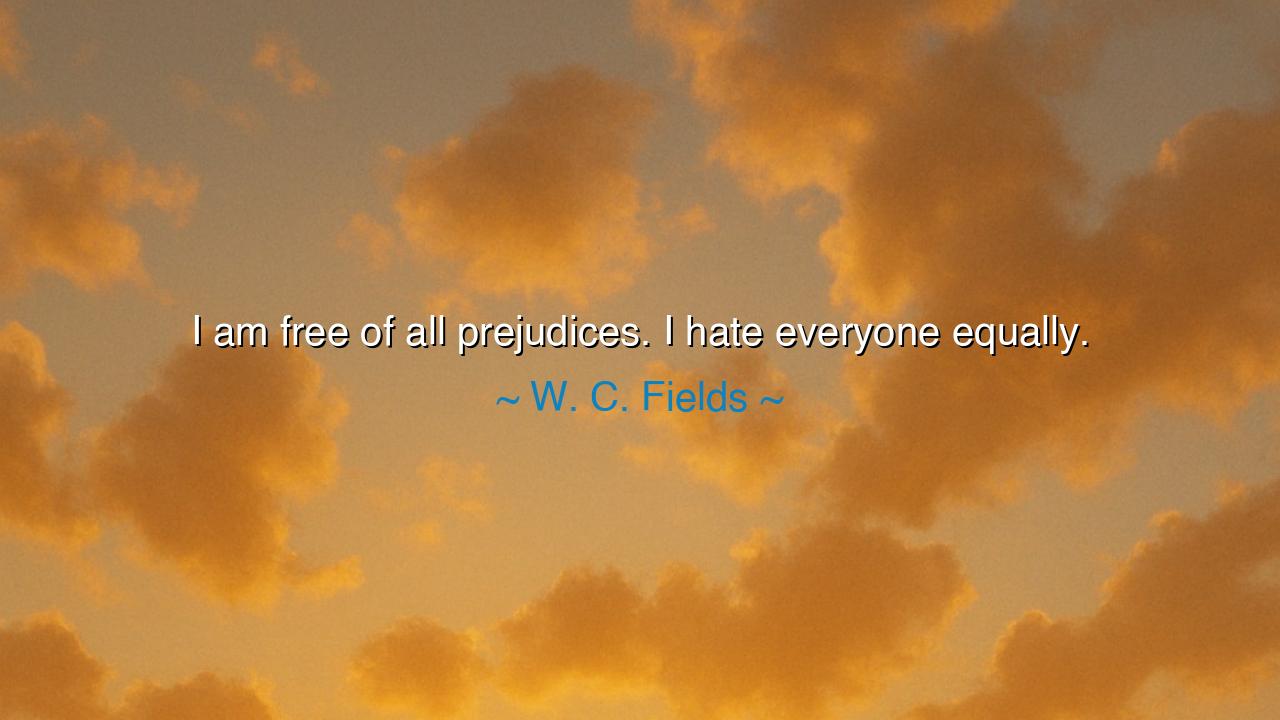
I am free of all prejudices. I hate everyone equally.






When W. C. Fields declared, “I am free of all prejudices. I hate everyone equally,” his tongue was sharp with humor, yet behind that laughter lingered a truth as bitter as it was wise. Like the jester in the court of kings, Fields spoke in jest to reveal the folly of mankind. He held a mirror to the human heart, showing that even those who proclaim themselves without prejudice often harbor the seeds of judgment. By claiming to “hate everyone equally,” he mocked both the hypocrisy of those who claim to be above bias and the tragic nature of human division. His laughter was a mask for truth, his comedy a form of philosophy.
In the style of the ancients, we may say that Fields spoke as a cynic philosopher — not one who despised life, but one who sought to reveal it without illusion. The ancients knew that humor could be a vessel for wisdom. Diogenes of Sinope, who lived in a barrel and mocked the pride of princes, might have nodded in approval at Fields’s jest. For behind the laughter lies a warning: that prejudice is not merely the hatred of the other, but the blindness of the self. When Fields says he “hates everyone equally,” he strips away the veneer of moral superiority that so many wear, reminding us that equality without compassion is merely shared disdain.
The origin of this quote rests in the peculiar genius of W. C. Fields himself — a man whose wit was forged in hardship. Known for his dry humor, his disdain for sentimentality, and his sharp view of human nature, Fields built his comedy on the absurdities of life. Yet beneath the jokes was always a philosopher’s pulse. He saw the world’s pettiness — the greed, the envy, the small cruelties of daily living — and responded not with despair, but with laughter. His humor was armor against hypocrisy, and his “equal hatred” was not malice, but satire — a way of saying that all men, in their pride and folly, are equally flawed, and thus equally deserving of forgiveness.
There is a paradox hidden in Fields’s jest. To claim to “hate everyone equally” is, in a strange way, to love justice. He mocks prejudice by refusing to single anyone out. If he despises humanity, it is only because he sees it whole — its vanities, its contradictions, its restless heart forever caught between greatness and pettiness. And in that shared imperfection lies the seed of equality. For true equality, as he implies, is not found in denial of difference, but in the recognition that all are bound by the same frailty. His irony becomes almost compassionate: in mocking hatred, he teaches humility.
Consider the tale of Mark Twain, another humorist whose laughter carried the weight of truth. Twain, like Fields, often used irony to expose prejudice. In The Adventures of Huckleberry Finn, he wrote through the eyes of a boy who, in his innocence, sees the madness of a world divided by color and class. Twain’s humor disarms; his mockery of human foolishness, like Fields’s, becomes an act of moral rebellion. Both men remind us that to laugh at humanity is not to despise it, but to awaken it. Their humor, sharp as a sword, cuts away illusion to reveal the beating heart of truth beneath.
Yet Fields’s words also serve as a caution. If laughter is wisdom, cynicism can become poison when it forgets its purpose. To “hate everyone equally” may protect one from bias, but it also denies the warmth of love and the grace of forgiveness. The wise must know when to let irony dissolve into understanding. The lesson here is not to imitate his hatred, but to understand his humor — to see that prejudice is born not only from hatred, but from blindness, from forgetting that every human being carries both shadow and light. To free oneself of prejudice, one must not despise all, but learn to see all clearly — with eyes unclouded by pride.
Therefore, let this teaching endure: humor is the philosopher’s torch, revealing what solemn words cannot. When you encounter folly, do not meet it with hatred, but with laughter that enlightens. When you face difference, do not seek superiority, but understanding. Laugh, as W. C. Fields laughed — not to mock the weak, but to expose the absurdity of the world’s divisions. And when you find yourself tempted to judge, remember that wisdom begins in recognizing your own imperfection. For the heart that can laugh at itself, that can see truth even in jest, is the heart most free — free of prejudice, free of pride, and, perhaps, free at last to love.






AAdministratorAdministrator
Welcome, honored guests. Please leave a comment, we will respond soon